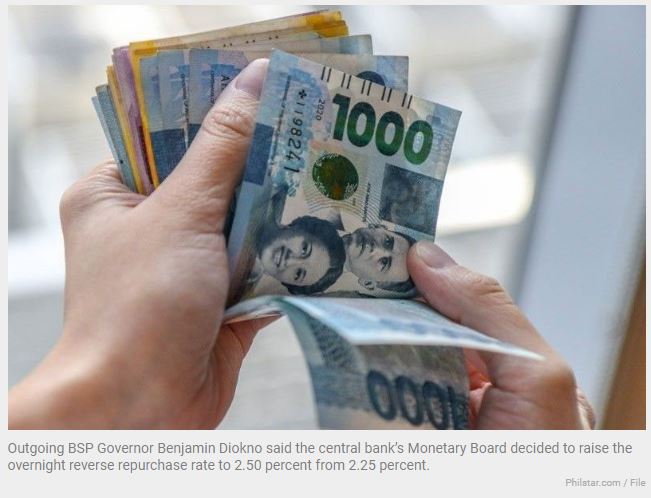Philippines: Interest rates raised anew
As expected, BSP delivers back-to-back hikes
MANILA, Philippines — The Bangko Sentral ng Pilipinas (BSP) yesterday delivered back-to-back rate hikes, raising key policy rates by 25 basis points, to fend off rising inflationary pressures.
Outgoing BSP Governor Benjamin Diokno said the central bank’s Monetary Board decided to raise the overnight reverse repurchase rate to 2.50 percent from 2.25 percent.
Likewise, the overnight deposit rate was increased by 25 basis points to two percent and the overnight lending rate to three percent.
“In deciding to raise the policy interest rate anew, the Monetary Board noted that upside risks continue to dominate the inflation outlook up to 2023, with pressures emanating from the potential impact of higher global non-oil prices, the continued shortage in domestic fish supply, as well as pending petitions for transport fare hikes due to elevated oil prices,” Diokno said.
Meanwhile, the incoming finance secretary said that the impact of a weaker-than-expected global recovery and the possible reimposition of local COVID-19 restrictions amid an uptick in infections continue to be the main downside risks to the outlook.
The central bank now expects inflation to breach the government’s two to four percent target range in 2022 and 2023 before easing back to within the target by 2024.
“At the same time, inflation expectations have continued to rise. While they remain within the target range for 2023 and 2024, elevated expectations highlight the risk of further second-round effects arising from sustained price pressures,” Diokno added.
According to Diokno, the Monetary Board believes that a follow-through increase in the policy rate enables the BSP to withdraw its stimulus measures while safeguarding macroeconomic stability amid rising global commodity prices and strong external headwinds to domestic economic growth.
The BSP started its own interest rate liftoff when it raised policy rates by 25 basis points last May 19, the first in more than three years or since November 2018.
Inflation averaged 4.1 percent and breached the two to four percent target in the first five months of the year after quickening to 5.4 percent in May from 4.9 percent due to soaring global oil and commodity prices brought about by the impact of the Russia-Ukraine war.
Diokno stressed the need for carefully coordinated efforts of other government agencies as part of a whole-of-government approach in implementing non-monetary interventions to mitigate the impact of persistent supply-side factors on inflation.
“In line with the ongoing normalization of its monetary policy settings, the BSP is prepared to take all necessary policy actions to bring inflation toward a target-consistent path over the medium term and deliver on its primary mandate of price stability,” Diokno said.
BSP Deputy Governor Francisco Dakila Jr. said the Monetary Board further raised its inflation forecasts to five instead of 4.6 percent for 2022 and to 4.2 instead of 3.9 percent for 2023.
Dakila said inflation is seen reverting to within the target range at 3.3 percent in 2024.
“The adjustments are due largely to the following factors: higher than expected inflation outturn in May, and the latest outlook may be pointing to a high inflation number in June; also higher assumptions for oil and non-oil prices as well as the approved jeepney fare hike,” Dakila said.
The central bank is now projecting global oil prices to average $106.30 instead of $100.04 per barrel in 2022 and $95.30 instead of $89.50 for 2023.
According to Dakila, the BSP sees inflation averaging 5.6 percent in the second half of the year due to the continued rise in global commodity prices, as well as more pronounced second round effects on domestic goods and services.
“The forecast path also suggests that inflation is likely to remain above the target range until the first half of 2023 before decelerating thereafter as both global oil and non-oil prices taper off,” Dakila said.
According to Dakila, the risks to inflation are tilted to the upside for 2022 and 2023 before balancing out in 2024. Upside pressures emanate from the potential impact of higher global oil and non-oil prices, the continued shortage in fish supply, as well as additional transport fare hikes due to rising oil prices.
Rizal Commercial Banking Corp. chief economist Michael Ricafort said local policy rate hikes are still possible in the coming months amid narrowing gap between local policy rate, currently at 2.50 percent and 1.75 percent of the US Federal Reserve in view of more aggressive Fed rate hikes in the coming months.
Ricafort added that policy rate hikes in the coming months are needed to address risk of second-round inflation effects after the approved minimum wage hikes and the hike in the minimum transport fares that would lead to higher prices of other affected goods and services in the economy.
Source: https://www.philstar.com/business/2022/06/24/2190435/interest-rates-raised-anew


 Thailand
Thailand




